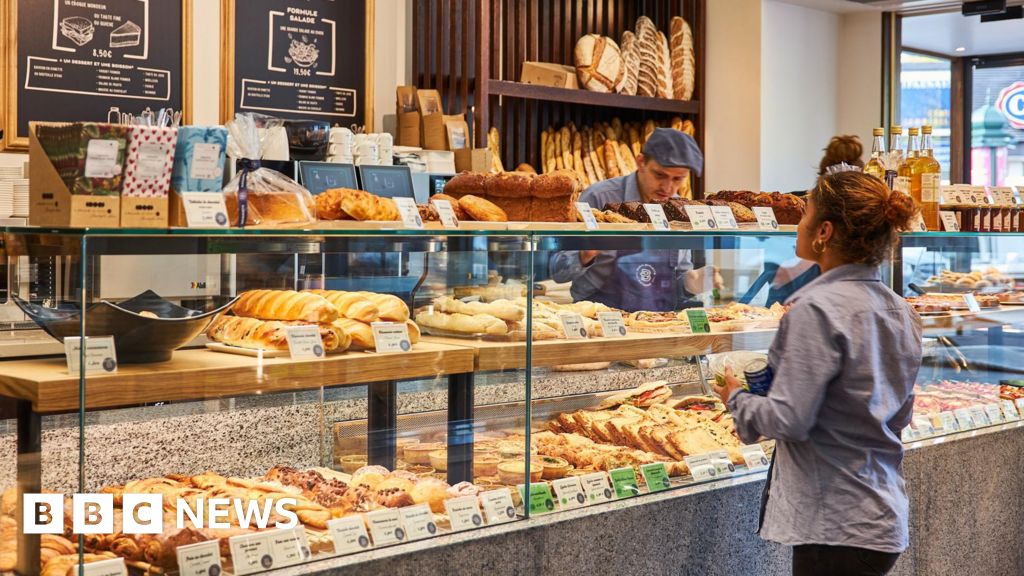Head into the basement of any bustling mall in Singapore and the chances are you will smell the sweetness of fresh, buttery baked goods.
Long lines of people swarm the counters of Korean, Japanese, Taiwanese and Singaporean bakeries – tray and tongs in hand, after picking out cream rolls and milk breads or filled croissants and fruity pastries from crowded display cabinets.
For Paris Baguette, its inspiration is clearly in the name, the outlets are also decorated with the colours of the tricolour, the signage shows the Eiffel Tower and the ambience seems to be aiming for something close to the charm of a Parisian cafe.
But it is 100% Korean.
“I wouldn’t limit our bread to everything from France. We are an international brand,” says Jin-soo Hur, president and chief executive of SPC Group, which owns Paris Baguette.
“Like croissants, could you say this is a European product? I would say it’s a universal product.”
SPC traces its roots back to a small family-owned bakery shop that opened 80 years ago.
It is now a key player in mass producing bread and pastries in South Korea, employing 20,000 people across all its brands. SPC says its sales hit $5.6bn (£4.26bn) last year.
In 1988, Paris Baguette was born becoming the first Korean bakery brand to open an international store in China, which continues to be a big market.
Today it has 4,000 stores across 14 countries including in Asia, Europe and the US.
Paris Baguette has big overseas expansion plans, setting a target of more than 1,000 new branches internationally by 2030 – many of them in the US.
It’s investing in a factory in Texas which will become its largest overseas production facility when it is completed in 2027, supplying the US, Canada and Latin America.
For Mr Hur, capturing the American market is a priority because it would mean Paris Baguette has succeeded internationally.
Food as culture
Sport is central to Paris Baguette’s strategy through a partnership with English Premier League football club Tottenham Hotspur.
It had a similar deal with France’s Paris St Germaine for two seasons, providing fans with its baked products and desserts on match days of home games.
“I think food is culture. Sports brings a lot of people into the stadium, and there’s always good vibes in London,” said Mr Hur.
The captain of South Korea’s national team was also the captain of Spurs. Son Heung-min led his team to victory in the Europa League last month, ending the club’s 17-year wait for a trophy.
It’s not about a Korean leading Spurs for Mr Hur though.
Tottenham is a “top club and Paris Baguette wants to be best in class too,” he says.
K-mania
Workers don’t like to wake up early to knead dough by hand, Mr Hur says softly.
He credits his company’s system of delivering frozen dough to franchises around the world for improving efficiency and extending shelf life.
Asia has a strong heritage of baked goods, but with rapid urbanisation, and changing lifestyles demand for on-the-go convenience foods is growing steadily.
Bakeries across the region already offer a huge variety of items.
Staples like pain au chocolat and sandwiches are abundant, but they are also known for Asian-inspired flavours – be it pandan, durian, salted egg, red bean or matcha-filled croissants and pastries.
Paris Baguette is responding to the demand through a halal-certified plant in Malaysia, to supply customers in South East Asia and the Middle East.
With the fascination around Korean culture globally, experts say there could be an opportunity for Asian bakeries to see even more success.
Korean and Japanese culture is so popular around the world now that maybe they’re seeing things on their screen, and then they’re willing to try it as well, said Saveria Busato, a pastry and bakery chef at the Culinary Institute of America in Singapore.
“I just came back from a trip to Italy and I was quite surprised to see a lot of Asian bakery and pastry shops in Italy and I was super happy.
To see the local people, the Italian people, that they were kind of exploring.”
But can frozen dough produce the same quality of goods as an artisanal bakery?
I put Chef Busato to a blind taste test. He pulls apart a croissant made with frozen dough (although he doesn’t know it), inspecting the elasticity and smelling it.
“This is quite bad. There is no honeycomb inside, it’s totally hollow. The lamination doesn’t have much strength because the internal part collapses. There is no butter profile. It’s gluey and dense. There is no smell,” he tells me.
Chef Busato acknowledges that it isn’t practical to seek artisanal standards if you’re mass-producing baked goods, and so big players will have to rely on frozen dough.
What about the traditional Asian baked goods though? Chef Busato on tasting a Korean milk bread, a fluffy white bread filled with cream, said he thinks it would do well in Europe.
“It’s fantastic. It’s very good. The smell of milk is coming over is nice. It’s fluffy. It’s refreshing… Reminds me of some kind of snack when I was younger that I was bringing to school.”
Adapting tastes
The cost-of-living crisis is a major challenge for Paris Baguette – not least because of the US inflation rate as it seeks to push into the American market. A lot of companies are having to change their business because it’s not profitable for them, Mr Hur says.
One of Paris Baguette’s biggest competitors globally – Pret A Manger – has had to experiment with subscription services and expand dine-in options after Covid pushed the sandwich and coffee chain into loss, and it was forced to close dozens of outlets and cut more than 3,000 jobs.
The global economic environment weighs on Mr Hur too but he insists profit is not his only goal. “If we are only trying to make profit, we’ll just stay in Korea,” he says.
“We want to change the bread culture around the world. I want to find a way to keep opening up a lot of bakeries. It is good for my country, and good for people.”
Other News: 255.Best
Source link:BBC


 فارسی
فارسی